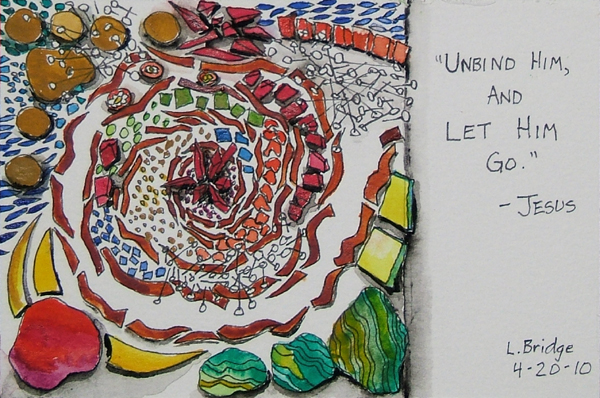Don’t have talent? Develop some!
watercolor sketch of a mosaic idea “UNBOUND“
4″ x 6″. copyright 2010 by Lynn Bridge
I promised you that I would review the book Talent Is Overrated– What Really Separates World-Class Performers from Everybody Else by Geoff Colvin, so that’s what I’m doing today. He starts by asking the question ‘Why aren’t most of us, and the people we know, world-class talents at what we do?’ The question that naturally follows is ‘Why are some people world-class talents?’
Although Colvin presents the research done on many competencies, and there is consistency in the messages, his emphasis is on the domain of business competency. Most of us need business competency at some level, no matter our profession, but we also need to know that we can continue to grow and improve in our chosen field.
*Here is a spoiler alert!* The simple answer to the ‘why’ questions already mentioned is that some people practice a whole lot more than others of us. And, they don’t just practice by repeating the same routines over and over, but they tackle and improve specific points with each repetition. World-class performance in any area is produced by amount and quality of practice! Furthermore, creative thinking in a person increases with the increase in the amount of knowledge that person has in the particular sphere of work she practices. Greater domain knowledge does not produce greater inflexibility in thinking, as we so often assume.
Are you curious about how you can acquire more domain knowledge and about how you can improve your performance? Colvin has specific suggestions that are all based on scientific evidence. Toward the end of the book he also explores the roots of motivation, pulling out some plausible conclusions from more studies.
Colvin’s book is intuitive to me because I raised three children in the Suzuki Method of Talent Education. The two seminal books by Dr. Sinichi Suzuki are Ability Development from Age Zero and Nurtured By Love. The basis for Sinichi Suzuki’s method is the observation he made back in the 1930’s that all children learn their native language, and learn it with a high degree of fluency. He asked how this happens, and his conclusions, in short, are that children are bathed in their native language even before they are born. They practice in tiny bits of word construction until they master those skills. And they constantly review (repeat endlessly) what they already know. Does this sound like a toddler to you?
Applying this same principle to developing extraordinary talent in another area, musical instrument-playing, Suzuki had the child listen to her pieces of music from the curriculum countless times before ever learning those pieces on an instrument. Then, when the child was learning a piece, the hard parts were isolated and practiced in such a way that successful practice strengthened the child’s skill. Finally, children kept playing old familiar pieces for years afterward in order to improve and build on the skills that had gone before.
I have seen this method work extraordinarily well- repeatedly. When the parents do their helping job consistently, and the teacher knows what he is doing and understands the psychology of the method, as well as the best ways to play the instrument and interpret music, the children are inevitably highly talented in this area. This pays off by giving the children confidence in their own work, and confidence that they can achieve in other areas, too.
There is nothing too surprising about anything I have reviewed for you in this post. However, we tend to have the nagging suspicion that some people are born superior to others, and that there is nothing to be changed about that. I believe that if we think that our talent development is in our own hands, and our children’s talent is, too, we will act in far different ways to nurture talent than if we believe such things are inborn or pre-ordained.
By the way, yes it’s true, my adult children still play multiple instruments and one is even a sought-after Suzuki method violin teacher! See the website for the Ballance Duo; my son-in-law the cellist and my daughter, the violinist. On the “press page” of the website, you can listen to musical selections played by the duo and by their piano trio, also.


Extremely interesting post! I am going to put the book, Talent is Overrated, on my reading list.
LikeLike
Hannah, my whole exploration of the concept of talent started 27 years ago with the simple question from a fellow choir member, “Do you want to come hear my (3-year-old) daughter’s piano recital? She is playing Mozart.”
LikeLike
Great review Hannah. Malcom Gladwell, author of “Outliers” has a simular take on talent and successful people. I have never heard of the Suzuki Method. It sounds very possitive.
LikeLike
Lanie, I will take note of the Malcom Gladwell book, Thanks.
LikeLike